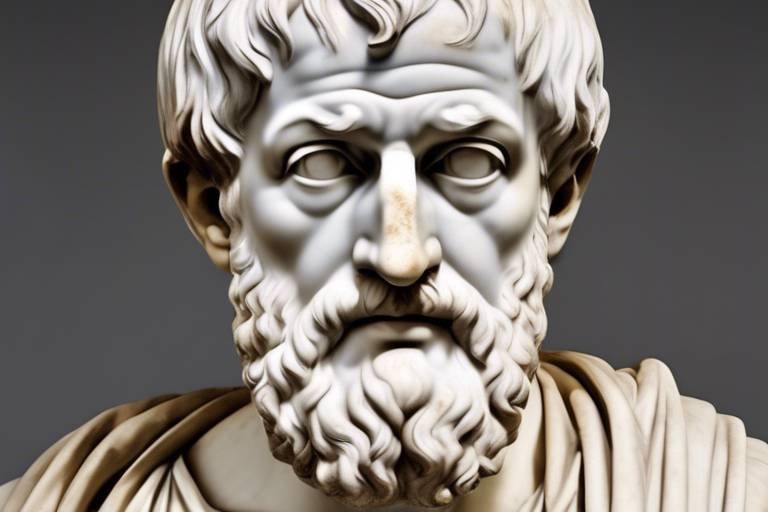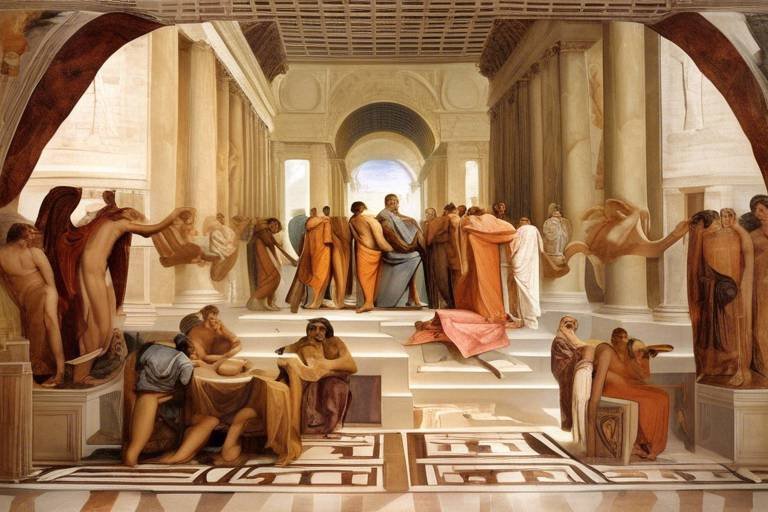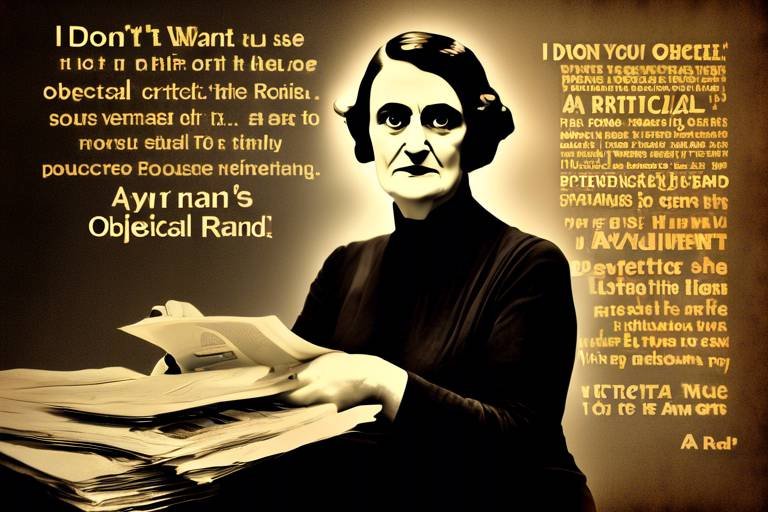Aristotle's Virtue Ethics - A Modern Perspective
In a world where ethical dilemmas often feel like navigating a minefield, Aristotle's virtue ethics offers a refreshing approach. Imagine a compass that not only points you in the right direction but also helps you understand the terrain you’re traversing. This ancient philosophy emphasizes the importance of character and virtue over rigid rules or the outcomes of actions. It invites us to cultivate our inner selves to make better choices in our daily lives. So, what exactly does this mean in the context of our modern world? Let’s dive into the foundational concepts of virtue ethics and see how they can illuminate our path through contemporary moral challenges.
At its core, virtue ethics is all about the individual. Unlike consequentialism, which focuses on the results of actions, or deontology, which emphasizes rules and duties, virtue ethics asks us to consider who we are as people. Aristotle defined virtue as a trait of character manifested in habitual action that lies between deficiency and excess. For instance, courage is a virtue that sits between the extremes of recklessness and cowardice. This concept is not just philosophical jargon; it serves as a practical guide for living a fulfilled life. In today’s fast-paced society, where decisions are often made in a hurry, virtue ethics nudges us to pause and reflect on our character before acting.
Character is the bedrock of virtue ethics. It’s not just about what we do; it’s about who we are. Our personal traits significantly influence our moral decisions. Think of character as the soil in which virtues can grow. If the soil is rich and well-tended, the virtues will flourish, leading to a flourishing life. Aristotle believed that developing virtues is a lifelong process, much like nurturing a garden. We must actively cultivate our character through practice, reflection, and experience. This means that every choice we make, every habit we form, contributes to our moral character. Are you the type of person who seeks to develop virtues like honesty, kindness, and integrity? If so, you’re on the right path!
One of the most intriguing aspects of Aristotle's virtue ethics is the Doctrine of the Mean. This principle suggests that virtue lies between two extremes. Imagine a tightrope walker balancing between two cliffs; one side represents deficiency and the other excess. Achieving moral excellence requires finding that delicate balance. For example, think about generosity. Too little can lead to stinginess, while too much can result in wastefulness. The key is to find that sweet spot where you can give without overextending yourself. This balance is not a one-size-fits-all solution; it varies from person to person and situation to situation. It’s about practical wisdom—knowing how to act rightly in different contexts.
To better understand how these concepts play out in real life, let’s look at some specific virtues:
- Courage: The ability to confront fear and uncertainty.
- Temperance: Moderation in all things, especially pleasure.
- Justice: Fairness in treatment and distribution of resources.
Each of these virtues contributes significantly to moral character and ethical behavior. For instance, a courageous person might stand up for someone being treated unfairly, while a temperate individual knows how to enjoy life’s pleasures without overindulgence. These virtues are not just abstract ideas; they are essential qualities that shape our interactions and decisions every day.
Understanding the deficiencies and excesses of virtues is crucial for moral development. When virtues are taken to extremes, they can lead to moral failures. For example, excessive courage can morph into recklessness, while a deficiency in it can lead to cowardice. Similarly, too much temperance can result in a lack of enjoyment in life, while too little can lead to hedonism. It’s essential to recognize these pitfalls to avoid poor decision-making. By being aware of where we might fall on this spectrum, we can strive for a more balanced approach to our virtues.
So, how do we apply Aristotle's principles in our modern lives? Virtue ethics remains incredibly relevant today. In the realm of business ethics, leaders who embody virtues like honesty and integrity can foster trust and loyalty among employees and customers. In personal relationships, cultivating virtues such as empathy and kindness can lead to deeper connections and understanding. Furthermore, in discussions surrounding social justice, virtue ethics encourages individuals to act with fairness and compassion, promoting a more equitable society. By integrating these ancient principles into our contemporary dilemmas, we can navigate our moral landscapes with greater clarity and purpose.
1. What is virtue ethics?
Virtue ethics is an ethical framework that emphasizes the role of character and virtue in moral philosophy, rather than rules or consequences.
2. How does Aristotle define virtue?
Aristotle defines virtue as a trait of character manifested in habitual action, lying between deficiency and excess.
3. Why is the Doctrine of the Mean important?
The Doctrine of the Mean is important because it illustrates that virtue lies between extremes, guiding us to find balance in our actions.
4. Can virtue ethics be applied in modern contexts?
Yes, virtue ethics can be applied in various modern contexts, including business ethics, personal relationships, and social justice, helping individuals make morally sound decisions.

Understanding Virtue Ethics
When we dive into the world of virtue ethics, we're stepping into a realm where character takes center stage. Unlike other ethical frameworks that focus on rules or the consequences of actions, virtue ethics emphasizes the importance of being a good person. Aristotle, the great Greek philosopher, defined virtue as a trait of character manifested in habitual action that lies between the extremes of deficiency and excess. So, what does that mean for us today? It means that our moral compass is guided not just by what we do, but by who we are.
At its core, virtue ethics invites us to consider the kind of person we strive to be. Are we aiming for courage, honesty, or kindness? These virtues are not merely abstract concepts; they are the building blocks of a fulfilling life. Aristotle believed that virtues are essential for achieving eudaimonia, often translated as "flourishing" or "the good life." This notion suggests that living virtuously is not just about following rules but about cultivating a character that leads to genuine happiness and well-being.
Now, let’s contrast this with other ethical theories. For instance, deontology focuses on adherence to rules, while consequentialism evaluates the morality of an action based on its outcomes. In contrast, virtue ethics asks us to look inward and reflect on our character traits. It’s like comparing a recipe to a chef; while the recipe provides the steps (rules) to follow, the chef’s skill (character) determines the quality of the meal (outcome).
Aristotle’s virtue ethics can be summarized through a few key points:
- Character Matters: Our traits shape our decisions and actions.
- Virtues are Habits: They are cultivated through practice and repetition.
- Balance is Key: Virtue lies in finding the mean between extremes.
In essence, understanding virtue ethics is about recognizing that moral excellence is not just a checklist of do's and don'ts but a lifelong journey of personal growth. It challenges us to ask ourselves, "What kind of person do I want to become?" and "How can I embody the virtues that lead to a flourishing life?" As we explore this ethical framework further, we will uncover its relevance in our daily lives and how it can guide us in making ethical decisions that reflect our true character.

The Role of Character
Character is the cornerstone of Aristotle's virtue ethics. In a world where decisions often come wrapped in complex dilemmas, the traits we embody shape not only our choices but also the very essence of our being. Think of character as the compass that guides us through the murky waters of moral challenges. Just like a seasoned sailor relies on the stars to navigate, individuals must rely on their character to steer them toward ethical shores. Aristotle believed that cultivating a virtuous character leads to a flourishing life, or what he termed "eudaimonia." This flourishing isn't just about personal happiness; it's about contributing positively to society and fostering a sense of community.
To understand how character influences moral decisions, we must first appreciate that virtues are not merely abstract ideals. They are, in fact, deeply ingrained habits that shape our responses to various situations. For instance, when faced with a challenging scenario, a person with a strong character will likely draw upon their virtues, such as honesty or courage, to guide their actions. This reliance on character traits fosters consistency in behavior, which is crucial for building trust in relationships, whether personal or professional. Imagine a leader who consistently demonstrates integrity; their team is more likely to follow them not just out of duty, but out of respect for their character.
Moreover, Aristotle emphasized that virtues are developed through practice and habituation. Just as an athlete trains to excel in their sport, individuals must consciously work on their character traits. This process involves reflecting on one's actions, seeking feedback, and being open to growth. In essence, the journey of character development is a lifelong endeavor. It requires a balance between self-awareness and the willingness to change. One might ask, how can we effectively cultivate virtues in our daily lives? The answer lies in creating environments that encourage moral reflection and ethical behavior.
In addition to personal traits, the role of community cannot be overlooked. Aristotle believed that a virtuous character is often nurtured in a supportive environment. Surrounding oneself with individuals who exemplify strong character can inspire one to adopt similar virtues. This is where the concept of moral exemplars comes into play. By observing and learning from those who embody the virtues we aspire to, we can better align our actions with our ethical goals. So, consider this: who in your life serves as a moral compass? Engaging with such individuals can significantly enhance our character development.
In conclusion, character is not just a backdrop to our moral decisions; it is the very fabric that weaves together our ethical lives. By understanding and cultivating our character, we not only improve our personal decision-making but also contribute to the moral fabric of society. As we strive for a more ethical world, let us remember that our character is the foundation upon which our actions stand. After all, in the grand tapestry of life, it is our character that ultimately defines the quality of our existence.

The Doctrine of the Mean
Aristotle's Doctrine of the Mean is a fascinating concept that serves as a cornerstone of his virtue ethics. Imagine walking a tightrope: on one side, you have excess, and on the other, deficiency. The mean is that sweet spot in the middle where virtue resides, striking a balance between these two extremes. Aristotle believed that to achieve moral excellence, one must navigate life by finding this balance, which is not always easy. After all, life is full of temptations and distractions that can pull us toward either end of the spectrum.
To illustrate this idea, consider the virtue of courage. On one end, you have recklessness—charging headfirst into danger without a second thought. On the other, there's cowardice—failing to act when action is necessary. The mean, or true courage, lies in the ability to assess a situation calmly and act appropriately, weighing the risks against the potential benefits. This balance allows individuals to respond to challenges with confidence while avoiding the pitfalls of rashness or fear.
Aristotle also emphasized that finding the mean is not a one-size-fits-all solution; it is highly individualistic. What may be a moderate response for one person could be excessive or deficient for another. This subjectivity means that understanding oneself is crucial. Aristotle argued that practical wisdom, or phronesis, is essential for identifying the mean in various situations. This wisdom is cultivated through experience and reflection, allowing individuals to develop their moral character over time.
In practical terms, the Doctrine of the Mean can be applied to everyday decisions. For example, consider the virtue of generosity. The excess might be prodigality, where one gives away too much, potentially harming oneself or others. The deficiency could be stinginess, where one fails to help those in need. The mean, then, would be a balanced approach to giving—being generous when appropriate but also knowing one's limits. This balanced approach not only fosters personal growth but also contributes to a more harmonious society.
To further understand the Doctrine of the Mean, let's take a look at a simple table that summarizes some virtues and their corresponding excesses and deficiencies:
| Virtue | Excess | Deficiency |
|---|---|---|
| Courage | Recklessness | Cowardice |
| Generosity | Prodigality | Stinginess |
| Temperance | Intemperance | Insensibility |
In essence, Aristotle's Doctrine of the Mean challenges us to reflect on our own behaviors and choices. It invites us to ask ourselves: Are we acting with balance in our lives? Are we cultivating the virtues necessary for a fulfilling existence? By striving for that golden mean, we not only enhance our own lives but also contribute positively to the world around us. So, the next time you find yourself at a crossroads, remember the tightrope, and seek that virtuous balance.

Examples of Virtues
When we think about virtues, it’s like picturing a vibrant garden where each flower represents a different quality that contributes to a flourishing life. Virtues are not just abstract concepts; they are practical traits that shape our character and guide our actions. For instance, consider courage. This virtue is not merely about facing danger; it's about having the strength to confront fears, whether they're physical threats or emotional challenges. Imagine standing up for what you believe in, even when the odds are stacked against you. That’s courage in action!
Another vital virtue is temperance, which is all about balance and moderation. In a world that often pushes us toward excess—be it in food, drink, or even work—temperance teaches us to find harmony. It’s like walking a tightrope; too much on one side leads to a fall, but with temperance, we can navigate life's challenges without losing our footing.
Additionally, wisdom plays a crucial role in virtue ethics. It’s not just about having knowledge; it’s about applying that knowledge judiciously in real-life situations. Think of wisdom as the compass that guides us through the murky waters of ethical dilemmas. It helps us assess situations from multiple angles and make informed decisions that reflect our values.
To illustrate these virtues further, let’s take a look at some common examples:
| Virtue | Description | Real-Life Application |
|---|---|---|
| Courage | The ability to confront fear or uncertainty. | Speaking out against injustice. |
| Temperance | Practicing moderation and self-control. | Resisting the urge to overindulge in food or drink. |
| Wisdom | Applying knowledge and experience to make sound decisions. | Choosing the right path in a career or personal situation. |
These virtues are not just theoretical; they manifest in our daily lives. For example, when a friend is struggling, showing compassion—another key virtue—means being there to listen and support them without judgment. This act of kindness not only strengthens relationships but also fosters a sense of community and trust.
Ultimately, the beauty of Aristotle's virtue ethics lies in its focus on character development. By nurturing these virtues, we cultivate a moral compass that guides our actions, shaping us into individuals who not only strive for personal excellence but also contribute positively to society. It’s about creating a ripple effect where our virtuous actions inspire others to do the same, leading to a more ethical and harmonious world.
- What are the main virtues according to Aristotle? Aristotle emphasized virtues like courage, temperance, wisdom, and justice as essential for a good life.
- How can I cultivate virtues in my daily life? Start by practicing self-reflection, setting personal goals for improvement, and seeking feedback from others.
- Are virtues universal? While some virtues may be recognized across cultures, their interpretation and importance can vary significantly.

Deficiency and Excess
When we talk about virtue ethics, one of the most fascinating aspects is Aristotle's concept of deficiency and excess. Imagine virtues as a tightrope walk; if you lean too far to one side, you risk falling into deficiency, while leaning too far the other way leads to excess. This balance is crucial for achieving moral excellence and living a flourishing life. Aristotle believed that every virtue exists as a mean between two vices: one of deficiency and one of excess. For instance, consider the virtue of courage. On one end, we have recklessness, where a person acts without regard for danger, while on the other end lies cowardice, where fear prevents action altogether. The virtue of courage, therefore, is the sweet spot in between.
Understanding this balance is not just an academic exercise; it has real-world implications. In our daily lives, we often find ourselves teetering between these extremes. For example, think about generosity. A person who is overly generous might give away so much that they jeopardize their own well-being, falling into the vice of prodigality. Conversely, someone who is stingy may hoard resources, missing opportunities to help others, which is a form of deficiency. Thus, the challenge lies in recognizing where we stand on this spectrum and striving to cultivate the virtue itself.
To illustrate this concept further, let's look at a table that summarizes some common virtues along with their corresponding deficiencies and excesses:
| Virtue | Deficiency | Excess |
|---|---|---|
| Courage | Cowardice | Recklessness |
| Generosity | Stinginess | Prodigality |
| Temperance | Insensibility | Intemperance |
| Truthfulness | Self-deprecation | Boastfulness |
By examining these relationships, we can see that the path to virtue requires not just understanding what is right but also recognizing the pitfalls that lie on either side. It’s like navigating a ship through stormy seas; one must be vigilant to avoid the rocks of deficiency and the whirlpools of excess. This awareness can guide us in making better choices that align with our values and contribute to our moral character.
In a world where extremes often dominate our discussions—be it in politics, social issues, or personal relationships—Aristotle's insights remind us that moderation is key. By striving for balance, we not only enhance our own lives but also positively influence those around us. So, the next time you find yourself facing a moral decision, ask yourself: Are you leaning too far in one direction? Recognizing this can be the first step towards cultivating a more virtuous life.
- What is virtue ethics? Virtue ethics is an ethical framework that emphasizes character and virtues rather than rules or consequences in moral decision-making.
- How does deficiency and excess relate to virtues? Each virtue exists as a mean between two vices: deficiency (lack of virtue) and excess (overabundance of virtue).
- Can virtue ethics be applied in modern contexts? Yes, virtue ethics can be applied to various contemporary issues, including business ethics, personal relationships, and social justice.
- What are some examples of virtues? Examples include courage, generosity, temperance, and truthfulness, each with its own deficiency and excess.

Practical Applications Today
When we dive into the realm of practical applications of Aristotle's virtue ethics, it's fascinating to see how these ancient principles resonate in our modern lives. Think about it: in a world often driven by rules and consequences, virtue ethics invites us to focus on the kind of person we want to become. It's like having a compass that guides our moral decisions, encouraging us to cultivate virtuous traits rather than merely following a checklist of dos and don’ts.
In the business world, for example, virtue ethics has a profound impact. Companies that prioritize ethical leadership and character development often find themselves thriving in ways that go beyond mere profits. Imagine a workplace where integrity, courage, and empathy are valued over cutthroat competition. Such a culture not only enhances employee morale but also fosters loyalty among customers. A great illustration of this is Patagonia, a company that embodies environmental virtues, prioritizing sustainability over profit maximization. Their commitment to ethical practices resonates with consumers, building a brand that stands out in a crowded marketplace.
Moreover, in personal relationships, virtue ethics encourages us to develop traits like honesty and compassion. Have you ever noticed how relationships flourish when both parties are committed to being their best selves? When we strive to embody virtues, we create a foundation of trust and respect. This is particularly relevant in today's digital age, where interactions can often feel superficial. By focusing on character, we can cultivate deeper, more meaningful connections, whether with family, friends, or colleagues.
In the realm of social justice, Aristotle's teachings remind us that moral excellence is not just about individual virtue but also about contributing to the common good. Activists and leaders who embody virtues such as justice and courage inspire others to take action and challenge societal norms. For instance, movements advocating for equality and environmental sustainability draw upon these virtues, encouraging individuals to stand up for what is right. By fostering a community that values virtuous action, we create a more just and equitable society.
To illustrate how virtue ethics can be applied today, consider the following table that outlines some key areas where these principles are making a difference:
| Area | Application of Virtue Ethics | Example |
|---|---|---|
| Business | Ethical leadership and corporate responsibility | Patagonia's environmental initiatives |
| Personal Relationships | Building trust through honesty and empathy | Open communication in friendships |
| Social Justice | Advocating for the common good | Activism for racial equality |
In conclusion, Aristotle's virtue ethics is not just a relic of the past; it is a living framework that can guide us in navigating the complexities of modern life. By focusing on character and the cultivation of virtues, we can make decisions that not only benefit ourselves but also contribute positively to our communities. Whether in business, personal relationships, or social justice, the application of virtue ethics encourages us to strive for a more ethical and fulfilling existence.
- What is virtue ethics? Virtue ethics is a moral philosophy that emphasizes the importance of character and virtues in ethical decision-making, rather than focusing solely on rules or consequences.
- How can virtue ethics be applied in business? Companies can apply virtue ethics by fostering a culture of ethical leadership and corporate responsibility, prioritizing values such as integrity and sustainability.
- What role do virtues play in personal relationships? Virtues like honesty, empathy, and compassion are essential in building trust and fostering deeper connections in personal relationships.
- Can virtue ethics address social justice issues? Yes, virtue ethics encourages individuals to embody virtues that promote the common good, inspiring actions that challenge societal injustices.

Critiques of Virtue Ethics
While Aristotle's virtue ethics has garnered significant admiration for its emphasis on character and moral development, it is not without its critiques. One of the primary concerns is the framework's perceived lack of clear guidelines for action. Unlike deontological ethics, which provides specific rules to follow, virtue ethics often leaves individuals grappling with subjective interpretations of what constitutes a virtuous act. This ambiguity can lead to confusion in moral decision-making, especially in complex situations where the right course of action isn’t immediately clear.
Another critique revolves around the cultural biases embedded in Aristotle's original framework. Virtue ethics is often seen as reflective of ancient Greek values, which may not resonate with or be applicable to modern, diverse societies. Critics argue that the virtues Aristotle championed, such as courage and temperance, might not hold the same weight or relevance across different cultures and contexts. This raises an important question: can a virtue ethics approach be genuinely universal, or is it inherently limited by its historical and cultural roots?
Additionally, some philosophers argue that virtue ethics may encourage moral elitism. The idea that only those who have cultivated certain virtues can make ethical decisions might alienate individuals who struggle with moral development. This elitism can create a divide between those perceived as virtuous and those who are not, potentially leading to a lack of empathy and understanding for those on different moral journeys.
Moreover, the emphasis on character can sometimes overshadow the importance of the consequences of actions. Critics argue that a focus on virtues may lead to a neglect of the outcomes of one's actions, which can be detrimental in situations where the stakes are high. For instance, in business ethics, prioritizing a virtuous character over the potential negative impacts of a decision can result in harm to stakeholders. Thus, the balance between virtue and consequence becomes a pivotal point of contention in the critique of virtue ethics.
To summarize, the critiques of virtue ethics can be categorized as follows:
| Critique | Description |
|---|---|
| Lack of Clear Guidelines | Virtue ethics does not provide specific rules for action, leading to potential confusion in moral decision-making. |
| Cultural Biases | The virtues espoused by Aristotle may not be universally applicable across diverse cultures. |
| Moral Elitism | The focus on virtue may alienate those who struggle with moral development. |
| Neglect of Consequences | Emphasizing character may overshadow the importance of the outcomes of actions. |
Despite these critiques, many proponents of virtue ethics argue that the framework is adaptable and can evolve to address these concerns. By integrating insights from other ethical theories, such as consequentialism and deontology, virtue ethics can become a more robust and comprehensive approach to moral decision-making. This flexibility allows for a richer understanding of ethics that respects the complexities of human behavior and societal norms.
- What is virtue ethics? Virtue ethics is an ethical framework that emphasizes the role of character and virtues in moral philosophy, focusing on what kind of person one should be rather than specific actions.
- How does virtue ethics differ from other ethical theories? Unlike deontological and consequentialist theories, which focus on rules or outcomes, virtue ethics centers on the development of moral character and the cultivation of virtues.
- Can virtue ethics be applied in modern contexts? Yes, virtue ethics remains relevant today, providing insights into personal relationships, business ethics, and social justice by encouraging individuals to cultivate virtuous character traits.
- What are some common virtues in virtue ethics? Common virtues include courage, temperance, justice, and wisdom, each contributing to an individual's moral character and ethical behavior.

Responses to Critiques
While Aristotle's virtue ethics is celebrated for its focus on character and moral development, it is not without its fair share of critiques. One of the most common objections is that virtue ethics lacks clear, actionable guidelines for making decisions. Critics argue that without specific rules, individuals may be left in a moral quandary, unsure of how to act in complex situations. However, proponents of virtue ethics contend that this flexibility is actually one of its strengths. Instead of rigid rules, virtue ethics encourages individuals to cultivate their character and develop practical wisdom, enabling them to navigate ethical dilemmas more effectively.
Another critique involves the potential for cultural bias in Aristotle's framework. Some argue that the virtues he espoused may not be universally applicable across different cultures and societies. In response, advocates of virtue ethics emphasize the adaptability of Aristotle’s principles. They argue that while specific virtues may vary between cultures, the underlying goal of cultivating good character and striving for moral excellence is a universal aspiration. This means that virtue ethics can be tailored to fit various cultural contexts, allowing for a more inclusive approach to ethics.
Furthermore, critics often point out that virtue ethics may lead to moral relativism, where personal virtues could justify unethical actions. However, supporters counter this by highlighting the importance of community and relationships in virtue ethics. Aristotle believed that virtues are best understood in the context of one’s community. This communal aspect serves as a check on individual moral judgments, ensuring that personal virtues align with the greater good. By fostering a sense of belonging and responsibility towards others, virtue ethics can help mitigate the risks of moral relativism.
In addition, there is the concern that virtue ethics may overlook the significance of consequences in ethical decision-making. Critics argue that focusing solely on character can lead to neglecting the outcomes of actions. Yet, Aristotle himself did not dismiss the importance of consequences entirely; rather, he placed them within a broader framework of character development. Virtue ethics encourages individuals to consider how their actions affect not only their own character but also the well-being of others. This holistic approach allows for a balance between character, intention, and outcome, providing a more comprehensive ethical framework.
Ultimately, the responses to critiques of virtue ethics reveal its inherent flexibility and relevance in today’s diverse ethical landscape. By focusing on character development and the cultivation of virtues, individuals can navigate the complexities of modern moral dilemmas with a sense of purpose and direction. Virtue ethics invites us to reflect on who we want to be and how our actions contribute to a flourishing life, both for ourselves and for those around us.
- What is virtue ethics? Virtue ethics is an ethical framework that emphasizes the importance of character and virtues in moral decision-making rather than focusing solely on rules or consequences.
- How does Aristotle define virtue? Aristotle defines virtue as a trait of character manifested in habitual action, which lies between two extremes of deficiency and excess.
- Can virtue ethics be applied to modern issues? Yes, virtue ethics remains relevant today and can be applied to various contemporary issues such as business ethics, personal relationships, and social justice.
- What are some examples of virtues? Examples of virtues include courage, temperance, honesty, and compassion, each contributing to an individual's moral character.

Integrating Virtue Ethics with Other Theories
When we talk about ethics, it’s like throwing a party where different philosophies come together to create a vibrant discussion. Virtue ethics, with its focus on character and moral excellence, can sometimes feel like an outsider among the more rule-based frameworks like deontology and consequentialism. However, integrating virtue ethics with these other theories can lead to a richer understanding of moral decision-making.
Imagine you’re at a crossroads in life, and you need to make a significant choice. If you solely rely on rules (deontology) or outcomes (consequentialism), you might miss the essence of who you are. Here’s where virtue ethics shines! It encourages you to consider not just what you should do or what the consequences will be, but also who you want to become in the process. This holistic approach can be incredibly powerful.
Let’s break down how these theories can work together:
- Virtue Ethics and Deontology: Deontology emphasizes duties and rules. By integrating virtue ethics, we can ask, "What kind of person fulfills these duties?" This combination encourages individuals to develop a strong moral character while adhering to ethical obligations.
- Virtue Ethics and Consequentialism: While consequentialism focuses on the outcomes of actions, incorporating virtue ethics allows us to consider the character traits that lead to positive results. It’s not just about achieving good outcomes; it’s about fostering virtues that promote well-being.
In practical terms, this integration can be seen in various scenarios. Take a business leader, for example. They might use deontological principles to guide their company policies while also striving to cultivate a workplace culture that promotes virtues like honesty and integrity. This dual focus not only helps in making ethical decisions but also contributes to a healthier organizational environment.
Moreover, integrating these theories can address some of the limitations each framework has on its own. For instance, virtue ethics can sometimes be criticized for its lack of clear action guidelines. However, when paired with deontological rules, it provides a more structured approach to ethical dilemmas. Similarly, the potential for consequentialism to justify harmful actions in pursuit of good outcomes can be tempered by the emphasis on character that virtue ethics brings to the table.
In conclusion, the integration of virtue ethics with other ethical theories creates a multifaceted approach that respects individual character while providing clear guidelines for action. This combination not only enriches our understanding of morality but also equips us to navigate the complexities of modern life with a well-rounded ethical compass.
- What is virtue ethics? Virtue ethics is an ethical theory that emphasizes the role of character and virtues in moral philosophy rather than rules or consequences.
- How does virtue ethics differ from other ethical theories? Unlike deontology, which focuses on rules, or consequentialism, which emphasizes outcomes, virtue ethics centers on the moral character of individuals.
- Can virtue ethics be applied in business? Yes! Virtue ethics can guide leaders to foster a culture of integrity and responsibility while making ethical decisions.
- What are some criticisms of virtue ethics? Critics argue that virtue ethics lacks clear guidelines for action and may be culturally biased.
Frequently Asked Questions
- What is Aristotle's virtue ethics?
Aristotle's virtue ethics is a moral philosophy that emphasizes the importance of character and virtues in ethical decision-making, rather than focusing solely on rules or consequences. It suggests that living a good life involves cultivating positive traits that promote personal and communal flourishing.
- How does virtue ethics differ from other ethical frameworks?
Unlike deontology, which is rule-based, or consequentialism, which focuses on outcomes, virtue ethics centers around the individual's character. It asks not just what actions are right or wrong, but what kind of person one should strive to be.
- What is the Doctrine of the Mean?
The Doctrine of the Mean is a key concept in Aristotle's virtue ethics, suggesting that virtue lies between two extremes. For example, courage is a virtue that exists between the extremes of recklessness and cowardice. Achieving this balance is essential for moral excellence.
- Can you give examples of specific virtues?
Sure! Some examples of virtues include:
- Courage: The ability to confront fear and take risks for a good cause.
- Temperance: The practice of moderation in all aspects of life, especially regarding pleasures.
- Justice: Fairness in dealing with others and ensuring everyone receives what they deserve.
- What happens when virtues are taken to extremes?
When virtues are taken to extremes, they can lead to moral failures. For instance, excessive courage can become recklessness, while too much temperance might lead to asceticism, which can be detrimental to one's well-being and relationships.
- How can virtue ethics be applied in modern contexts?
Virtue ethics can be applied in various modern contexts, such as:
- Business ethics, where integrity and honesty are paramount.
- Personal relationships, emphasizing empathy and kindness.
- Social justice, advocating for fairness and equity in society.
- What are some critiques of virtue ethics?
Critiques of virtue ethics often point to its perceived lack of clear guidelines for action and potential cultural biases. Critics argue that it may not provide specific solutions for complex moral dilemmas.
- How do proponents respond to these critiques?
Proponents of virtue ethics argue that its flexibility allows for adaptability in diverse situations. They emphasize that developing a virtuous character can guide individuals in making ethical decisions, even when specific rules are not clear.
- Can virtue ethics be integrated with other ethical theories?
Yes! Virtue ethics can be integrated with consequentialism and deontology to create a more comprehensive approach to ethics. This integration respects multiple perspectives and encourages a fuller understanding of moral decision-making.



















